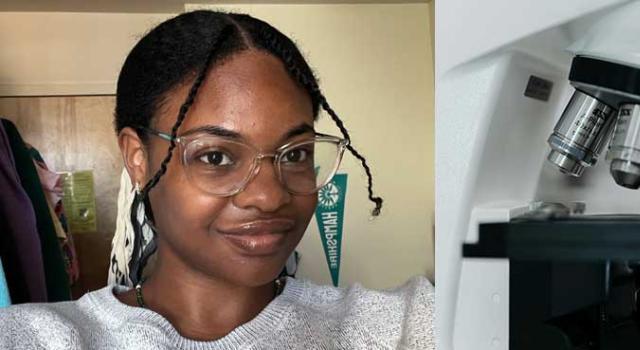Biological and Life Sciences
Biology and life science students at Hampshire take advantage of courses on campus and throughout the Five College consortium, studying various aspects of natural science, from ecology and evolution to physiology and immunology.
Students engage deeply in interdisciplinary problem solving, emphasizing real-world issues and often situating student research at the interfaces of the sciences, between, for instance, physics and biology or human health and the environment.
Student Project Titles
- Beyond Good and Evil: The Neurobiology of Morality
- Developing Synergystically Chimeric Acting Mouse-Human Antibodies Against Staphyloccocal Enterotoxin B (SEB)
- Non-invasive Genotyping of African Elephants and Essays on Biological Epistemology
- A millennial-scale dendrochronological reconstruction and interpretation of past climatological and entomological disturbances of the Pinus ponderosa lava forests of Newberry Crater National Monument in central Oregon
- Exploring Pseudomonas florescens as a Plant Growth
- Promoting Rhizobacteria
- The Evolution of Insect-Fungus Symbiosis
- Nutrition and Type II Diabetes in the White Mountain Apache
Sample First-Year Course
The Unknown Microbial Majority
Ten billion bacteria live in a mere pinch of soil. They represent thousands of species and directly affect the biogeochemical cycling of nutrients and wastes in every ecosystem on earth. Yet 99 percent are unknown to science. Students in this course will shed light upon this mysterious microbial majority through discussions based on their reading of the scientific research literature emphasizing molecular, genetic, physiological, and ecological knowledge. In addition, semester-long field and laboratory-based research projects will utilize modern molecular methods of analysis for assessing microbial diversity. Students will help design and carry out these research projects, develop skills at the laboratory bench, see the value of working closely in small groups, and spend time thinking about and practicing science.
Sample Courses at Hampshire
- Advanced Skeletal Biology
- Agriculture, Food, and Human Health
- Aliens: Close Encounters of a Multidisciplinary Kind
- The Biology and Sociology of Sports
- Endocrinology
- Ever Since Darwin
- Evolutionary Biology
- Gene Cloning
- Human Biological Variation
- Immunology
- Kitchen Ecology
- Law, Identity, and Bioscience
- Mathematical Biology
- Neurophysiological Mechanisms
- Physical Organic Chemistry
- Plant Biology
- Science and Religion: The History and
- Philosophy of an Uneasy Relationship
- Sex on the Brain: Gender, Sex, and Biology
- The Unknown Microbial Majority
- Tropical Ecology
- Zymurgy
Through the Consortium
- Biology of Social Issues (UMass)
- Cell Biology (SC)
- Developmental Biology (AC)
- Diversity of Life (MHC)
- General Genetics (UMass)
- Genetics, Genomics, and Evolution (SC)
- Genome Biology (AC)
- Organismal Biology (MHC)
- Pests, Plagues, and Profligates (SC)
Facilities and Resources
Cole Science Center
Hampshire College's Cole Science Center boasts some of the most up-to-date laboratories at any liberal arts college nationwide. Hampshire's open lab policy makes these facilities available to students at all levels.
First-year classes regularly use our ecology, chemistry, physiology, or molecular biology laboratories, gaining hands-on experience and learning basic experimental procedures, while natural science concentrators at the Division II and III levels design their own original research experiments in such fields as neuroendocrinology or genetics.
Students have full access to the labs outside of classroom hours in order to perform and analyze their experiments, and are given appropriate training in the use of complex and sophisticated equipment encountered elsewhere only at the graduate and post-graduate level. Hampshire's laboratory equipment includes a state-of-the-art laser ablation-inductively coupled plasma mass spectrometer, an inductively coupled plasma-atomic emission spectrometer, modern molecular biology and genetics instruments, ion chromatography, and many other resources.
The Five College Certificate in Culture, Health, and Science
The Five College Certificate in Culture, Health, and Science complements a traditional disciplinary major by allowing students to deepen their knowledge of human health, disease, and healing through an interdisciplinary focus.
The certificate is designed to foster holistic, biocultural, and interdisciplinary understandings of health and disease. Additionally, the Health Careers Advising Center at Hampshire helps interested students and graduates learn about the various health-related professions, evaluate their career goals and, ultimately, gain admission to professional schools when appropriate.



